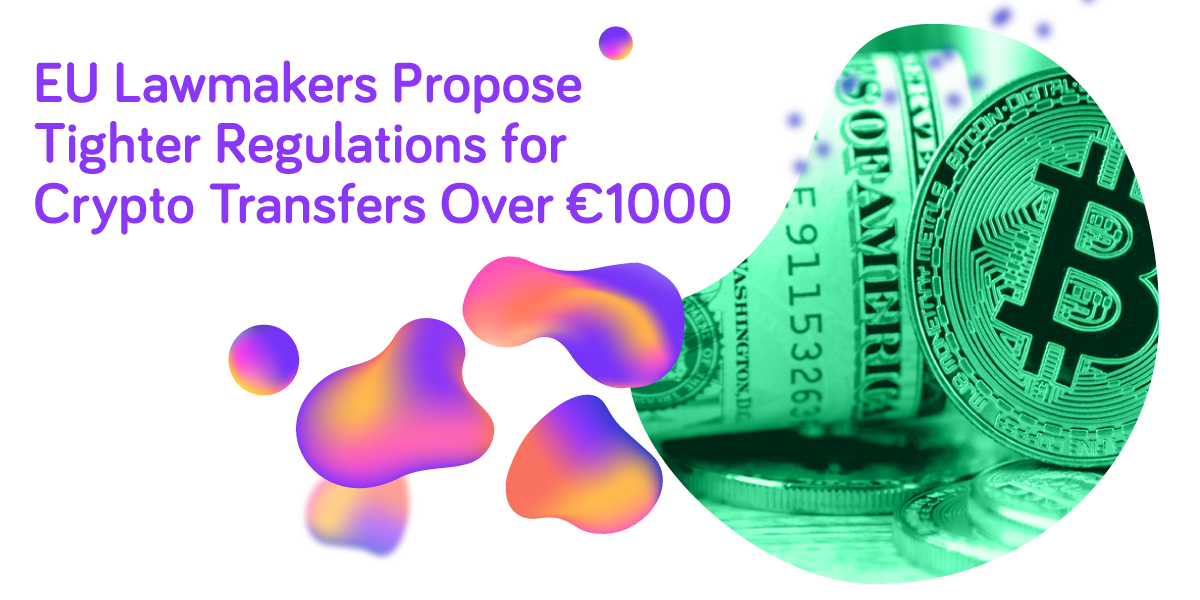European Union legislators recently voted on some controversial measures which prohibit anonymous cryptocurrency transactions, a move according to which industry’s innovation would stop and users’ confidentiality would be affected. Motions are meant to extend Anti Money Laundering conditions that apply to conventional payments over €1,000 (or $1,110) from the cryptocurrency sector. Also, people who transact or receive this amount would be identified, mainly if they use personal or unhosted wallets. Additional measures could result in a separation between unregulated crypto exchanges and the traditional financial system.
What is money laundering, and how can crypto participate in this process?
Money laundering is an illegal activity where a person or a group called an organized criminal group moves money through diverse places, systems, or institutions such that their origin is lost. These sums of money become legal after the process is done, and they can be spent anywhere. That’s why it’s called laundering — because they’re moved around until they’re “clean” and usable.
Cryptocurrency transactions are possible due to Blockchain Technology or data blocks and registries that are often public. Once a transaction is made, it will stay on The Blockchain forever — it can be searched and found, and many electronic wallets are traceable.
Keeping this in mind, some private Blockchains raise the issue of money laundering to a whole new level. These privacy Blockchains, whose transaction history can be accessed only by authorized people, are often used by companies to protect people’s identities and not disclose full transparency. In addition, this money can be moved around from one electronic wallet to another, hoping that it will lose track of the origing. Still, it’s very improbable that organized criminal groups would use such systems, given their complexity.
What are personal or unhosted wallets?
Electronic wallets can be of multiple types:
· Hosted: when we use an exchange platform such as IXFI. These companies or third parties hold cryptocurrencies for us. Coins are not directly bought, similar to how a bank works with economy accounts, even if they’re in a person’s name.
· Unhosted: these are web wallets and decentralized trading platforms where cryptocurrencies are kept. Some examples would be MetaMask and Private Key. These wallets provide an interface to verify funds and transactions, but the user needs to provide the password or authentication key at each login.
· Hardware: maybe you’ve heard stories about people who bought Bitcoin in 2010, and they’ve lost it. The auto-custody of this kind of wallet means keeping a private key for the own wallet, and there is nobody else who can access those funds.
New rules imposed by The European Union
Cryptocurrency advocates are worried that regulations would be impossible to respect for specific wallets because, being completely automated, they’re not controlled by humans. Thus they’re not tied to personal information. Others were worried that compliance requirements would put a burden on individual traders.
The European Union doesn’t plan to ban the cryptocurrency market. These are just some regulations that should have been expected. However, news harmed Bitcoin’s price, reaching $44,100 and then growing back up again. After that, many Altcoins followed. Many individuals and companies have expressed their disagreement regarding the proposed European regulations:
· Unstoppable Finance considers a massive regression for the crypto space: “Amendments are a huge setback for crypto in the EU and should be repealed in the dialogues”.
· Brian Armstrong, an important figure in crypto spaces, stated that it’s stupid that somebody has to verify each transaction over €1,000: “Imagine that your bank will report to authorities every time you pay the rent, just because the transaction is over €1,000”.
For more fresh information related to the crypto market, stay up-to-speed with your Medium blog. For a seamless trading experience, join Your Friendly Crypto Exchange. We’re on the journey to help you empower yourself and those around you towards a better financial future.
Disclaimer: The content of this article is not investment advice and does not constitute an offer or solicitation to offer or recommendation of any investment product. It is for general purposes only and does not take into account your individual needs, investment objectives and specific financial and fiscal circumstances.
Although the material contained in this article was prepared based on information from public and private sources that IXFI believes to be reliable, no representation, warranty or undertaking, stated or implied, is given as to the accuracy of the information contained herein, and IXFI expressly disclaims any liability for the accuracy and completeness of the information contained in this article.
Investment involves risk; any ideas or strategies discussed herein should therefore not be undertaken by any individual without prior consultation with a financial professional for the purpose of assessing whether the ideas or strategies that are discussed are suitable to you based on your own personal financial and fiscal objectives, needs and risk tolerance. IXFI expressly disclaims any liability or loss incurred by any person who acts on the information, ideas or strategies discussed herein.


